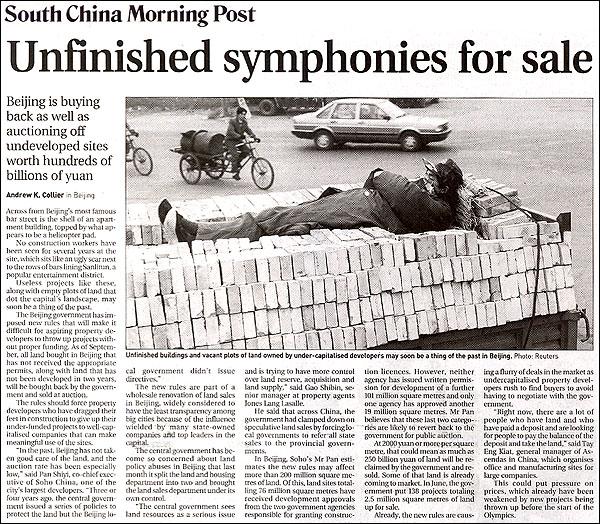
South China Morning Post, Thursday, July 8, 2004
Beijing is buying back as well as auctioning off undeveloped sites worth hundreds of billions of Yuan
Andrew K. Collier in Beijing
Across from Beijing's most famous bar street is the shell of an apartment building topped by what appears to be a helicopter pad.
No Construction workers have been seen for several years at the site, which sits like an ugly scar next to the rows of bars lining Sanlitun, a popular entertainment district.
Useless projects like these, along with empty plots of land that dot the capital's landscape, may soon be a thing of the past.
The Beijing government has imposed new rules that will make it difficult for aspiring property developers to throw up projects without proper funding. As of September, all land bought in Beijing that has not received the appropriate permits, along with land that has not been developed in two years will be bought back by the government and sold at auction.
The rules should force property developers who have dragged their feet in construction to give up their under-funded projects to well-capitalised companies that can make meaningful use of the sites.
"In the past Beijing has not taken good care of the land and the auction rate has been especially low," said Pan Shiyi, co-chief executive of Soho China, one of the cities largest developers. "Three or four years ago, the central government issued a series of policies to protect the land but the Beijing local government didn't issue directives."
The new rules are part of a wholesale renovation of land sales in Beijing, widely considered to have the least transparency among big cities because of the influence wielded by many of the state owned companies and top leaders in the capital.
The central government has become so concerned about land policy abuses in Beijing that last month it split the land and housing department into two and brought the land sales department under its own control.
"The central government sees land resources as a serious issue and is trying to have more control over land reserve, acquisition and land supply," said Gao Shibin, senior manager at property agents Jones Lang Lasalle.
He said that across China, the government had clamped down on speculative land sales by forcing local governments to refer all state sales to the provincial governments.
In Beijing, Soho's Mr Pan estimates that new rules may affect more than 200 million square meters of land. Of this, land sites totaling 76 million square metres have received development approvals from the two government agencies responsible for granting construction licenses. However, neither agency has issued written permission for development of a further 101 million square meters and only one agency approved another 19 million square metres. Mr Pan believes that these last two categories are likely to revert back to the government for public auction.
At 2000 yuan or more per square metre, that could mean as much as 250 billion yuan of land will be reclaimed by the government and resold. Some of that land is already coming to market. In June, the government put 138 projects totalling 2.5 million square metres of land up for sale.
Already the new rules are causing a flurry of deals in the market as undercapitalised property developers rush to find buyers to avoid having to negotiate with the government.
"Right now there are a lot of people who have land and who have paid a deposit and are looking for people to pay the balance of the deposit and take the land," said Tay Eng Kiat, general manager of Ascendas in China, which organises office and manufacturing sites for large companies.
This could put pressure on prices, which have already been weakened by new projects being thrown up before the start of the Olympics.





